Profit and Loss
In MCP Magazine's eighth annual salary survey, we evaluate the current state of compensation and provide our outlook for the future of Microsoft certified professionals across the U.S.
- By Kristen McCarthy, Dian Schaffhauser
- 01/01/2003
 WE'RE STRUGGLING IN A TIME OF MIXED MESSAGES. Is the economy getting better? Has it hit bottom? While compensation is up in 2003 for most titleholders, many IT professionals still just want a job. In MCP Magazine's eighth annual salary survey, we evaluate the current state of compensation and provide our outlook for the future of Microsoft certified professionals across the U.S.
WE'RE STRUGGLING IN A TIME OF MIXED MESSAGES. Is the economy getting better? Has it hit bottom? While compensation is up in 2003 for most titleholders, many IT professionals still just want a job. In MCP Magazine's eighth annual salary survey, we evaluate the current state of compensation and provide our outlook for the future of Microsoft certified professionals across the U.S.
For eight years, Microsoft Certified Professional Magazine has taken a hard look at how certified professionals go about doing their jobs, as well as how they're compensated. For the last several years, we've had to be the bearer of bad tidings. This year, we're pleased to report that salaries are, for the most part, on the rise. We know that -- as you read this year's results -- you're concerned with what's really going on out there, and you're curious about what the future holds: How big should your paycheck be? Does your certification matter? Should you simply be grateful to have a job at all? Where's the economy going? How can you best prepare for a strong future?
To get a true idea of what's happening out there in the trenches, we compiled the results of a survey, which included nearly 6,500 respondents in all age ranges, job titles, U.S. locations and levels of experience. What we found isn't as dismal as you might fear. In fact, we believe the future looks bright.
The Yin and Yang
This year has been challenging for all working professionals -- and those in the tech industry have felt the crunch even harder than most other professions. This year's survey brings a mixture of news, both good and bad.
Salaries across most certifications are (for the first time in three years) up. The average overall is $61,700. That's higher than it was the first year we did the survey. Back in our January/February 1996 issue, we reported an average of $59,980.
If you're an MCSE on Windows 2000, your salary has increased by 11 percent from last year. See Chart 1 for a breakdown of average base salaries across all Microsoft certifications.
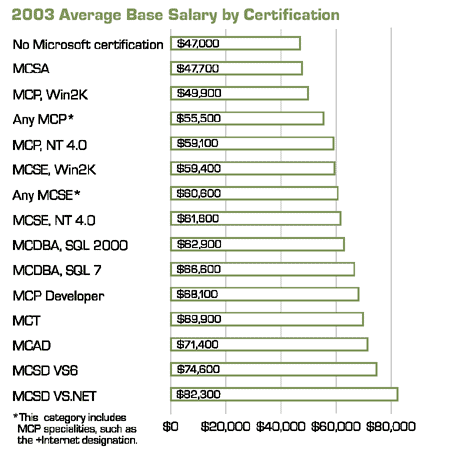 |
| Chart 1. We asked all respondents to provide their current annual income before taxes. Excluded are all bonuses (see Chart 4 for that information), salaries less than $27,500 and more than $150,000, and the incomes of the self-employed. |
While NT 4.0 MCSEs remain a step ahead of their Win2K counterparts, reaping an average of $61,600, they took a much smaller leap in compensation: about 3 percent. The gap between compensation for the two certifications is finally narrowing.
Could it be experience that explains the difference? Probably not. The NT 4.0 MCSE has an average of eight years of experience in networking. The Win2K MCSE has about 7.4 years of experience. We believe that once you reach that stage in your career, a few months' difference one way or the other has little impact on the income you can negotiate.
Who Makes What?
A Reality Check |
Pamela Evans, $31,000
MCP, A+, Network+
Systems Support Technician
4 years in IT
Little Rock, Arkansas
Ron DeLorenzo, $34,250
MCSE, MCSA, A+, Network+
Systems Support Technician
6 years in IT
Albany, New York
Lynn Sorensen
$80,000 plus $25,000 bonus
MCSE
Pre-Sales Systems Engineer
5 years in IT
Irvine, California
Michael Weaver, $78,000
MCP, A+, Network+, CNA
Network Systems Manager
12 years in IT
Bothell, Washington
Dave Maller, $55,800
MCSE, CNE, A+, Network+
Information Systems Analyst
7 years in IT
Portland, Oregon
Chris Harrison, $60,000
MCSE, CCEA, CAN
Network Engineer
12 years in IT
Chesterfield, Missouri
Don Harris, $67,000
MCSE, MCSA
Sr. IT Administrator
12 years in IT
Denver, Colorado
Tim Downs, $51,000
MCSE, MCSA
IT Specialist
5 years in IT
Phoenix, Arizona |
Interestingly, 93 percent of NT MCSEs report that they've deployed Win2K. That means they're immersed in the newer technology. Many believe they know what they're doing and may not feel the personal urge to prove it with an updated credential.
In addition, 89 percent of NT MCSEs named NT 4.0 as a primary area of expertise, vs. 66 percent of Win2K MCSEs. This may provide a bit of an advantage to you. Companies might simply value more highly those people who know "legacy systems" on top of current technologies.
Likewise, NT 4.0 MCSEs have been with their employers on average about five years, vs. four years for Win2K MCSEs. That adds the possibility of another year's worth of raises to the mix that the NT pros enjoy.
Salaries are also up for MCSAs (3 percent), MCPs on NT 4.0 (12 percent), and MCSDs (8 percent).
Developers continue to top the salary chart, with MCSDs on .NET bringing in $82,300; MCSDs on VS 6.0 garnering $74,600; and MCADs earning an average of $71,400.
The lowest rung is held by MCSAs, who report an average salary of $47,700. Note, however, that this is still slightly higher than non-MCPs, who reported an average of $47,000. We cull these latter participants from a list Microsoft provides of people who attempted an exam in the last year but failed it. Lest you think these people are simply new to the industry, they're actually fairly experienced IT professionals -- reporting an average of 5.5 years of time in the field.
We could predict that trainer salaries would drop -- this year by a single percent. The overall average compensation for MCTs has decreased slightly to $69,900 this year, from 2002's $70,600, and is a large difference from 2001's $78,000. This continued decrease -- along with the shrinkage in the number of MCTs -- can be attributed to continued tough times in the training industry. Interestingly, those who report their job title as "trainer" but may or may not possess the MCT title earn an average of $59,900. Only two-thirds of the respondents who said they held a "trainer" title also held the MCT credential.
But what surprised us is that database administrators experienced a salary drop for the first time of 7 percent. We find this odd, as the media would have us believe that companies are doing all they can to work smarter by mining data about existing customers. That should mean the value of MCDBAs would rise, because they're at the forefront of work done with SQL Server.
If we slice the compensation by job title, those who serve as a programming project lead are earning the most, with an average of $82,800. Help desk and support staff earn the least, at $47,100. However, that's up from 2002's $45,600. See Chart 2 for further details on salary by job title.
A Chilly Economic Climate
While most salaries are up, so is the number of unemployed professionals. About 10 percent of you have been laid off in the last 12 months. That's slightly higher than last year. While two-thirds of people who were laid off have found employment (60 percent found a new position and 8 percent were rehired), another third remain in the unemployment line. While the average length of unemployment lasted four months, nearly a quarter of unemployed IT professionals took from seven to 12 months to find a new position.
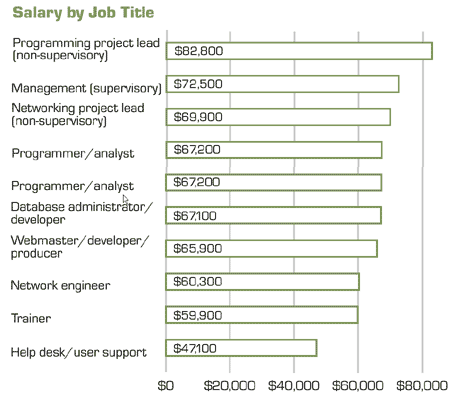 |
| Chart 2. One of the many determining factors in salary is job title. We asked respondents to choose the title that best describes their current position. Project lead is non-supervisory, but management is. Numbers are 2003 average base salary. To find more information about salary by title for each certification, see the complete version of the survey results. |
However, a third of currently working respondents said their companies plan to hire additional IT staff in the next 12 months. The average number of openings is nine. Among those organizations, 63 percent reported that Microsoft certification would play a qualifying factor in hiring.
When it comes to how you see the economic future, the vote is split fairly evenly. Forty-one percent of you believe that the U.S. is coming out of its economic downturn, while 42 percent don't. The remainder simply don't know. Among those who don't think there will be a positive economic shift any time soon, three-quarters believe that the continuation of these times would have a negative impact on your career. Eighty-two percent are convinced it already has.
A side note to this: 40 percent of you believe your Microsoft certification has had a positive impact on your job prospects. Seventy-four percent of you believe it will improve or enhance your ability to find employment or lead to a promotion in your current position. Those with newer titles are much more optimistic about the impact of certification on their future than those individuals who hold older titles. For example, 64 percent of MCSEs on NT 4.0 believe their titles will improve or enhance their ability to find or keep a job or lead to a job promotion in the next year. Eighty percent of MCSEs on Win2K believe that. Likewise, 66 percent of MCDBAs on SQL Server 7.0 put faith in the value of certification for employability, while 81 percent of MCDBAs on SQL Server 2000 do. See Chart 3 for the effect of Microsoft certification on overall salary.
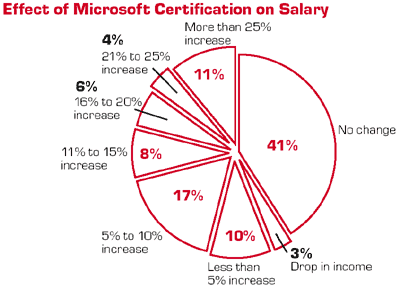 |
| Chart 3. Although many respondents felt their Microsoft certification had no effect on their salaries and salary increases have slowed this year; 17 percent of you reaped an increase of 5 to 10 percent (with a quarter of MCDBAs on SQL Server 7 earning such an increase), and 11 percent of you garnered a compensation increase of more than 25 percent. The average rise for those who experienced an increase was 12.4 percent. |
Beyond Salary
When you gauge the value of your current job, you probably consider those other aspects beyond basic compensation -- namely, benefits. Let's look at the details.
Forty-seven percent of respondents said they expect to receive a monetary bonus this year. That's down from 53 percent in 2002. Chart 4 shows what the expectations are by certification. Note that the non-certified respondents were the only ones who reported an average bonus that was less than a thousand dollars.
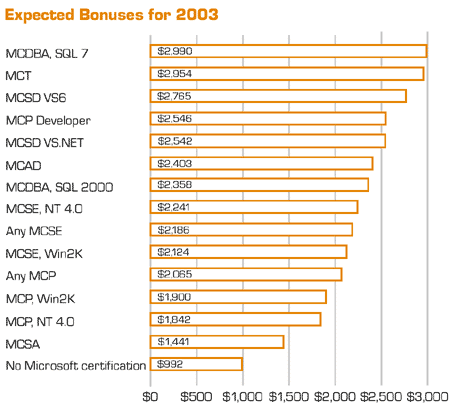 |
| Chart 4. We asked the 47 percent of respondents who said they expect to receive a monetary bonus this year how much it would be. The survey was conducted in April 2003, so the amounts shown are estimates of the total they expect to receive this year. |
Years ago, when dot-coms were exploding, it was assumed that stock options were a large part of the deal. Nowadays getting options doesn't seem nearly as important as finding a company with staying power. Nineteen percent of respondents said they receive stock options. That's down from 26 percent in 2001, the first year we asked about options.
The average number of options received was 3,460 (slightly lower than 2002's 3,839).
Another benefit that seems to be dwindling in this buyer's market is recognition (written, verbal or monetary) for continued certification. Last year, 33 percent of you reported that your company has a formal reward program for certification, while this year only 28 percent of you responded that technical certification is recognized. We believe this is an area where companies could do much better by their employees. After all, making sure to include recognition in the company newsletter for those who have earned a new title costs little in time. Likewise, giving staff members the chance to order new business cards to show off new logos is a low-cost benefit. These types of inexpensive recognition programs have a positive impact on staff morale and motivation and employee retention.
Certified professionals enjoy many other job benefits even if company recognition for their achievements is low on the list. The 401(k) with company contribution leads the pack for 70 percent of you. See Chart 5 for a listing by rank.
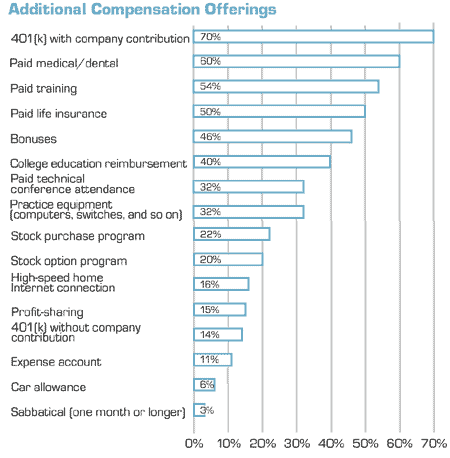 |
| Chart 5. When we asked respondents what kinds of benefits their companies provide, 401(k)s with company contribution outranked some of the more typical benefits, such as paid medical/dental. These results are fairly consistent within a few percentage points of last year's results. |
Are You Experienced?
As with most industries, skill and knowledge translate into greater compensation, and the technology sector is no different. Chart 6 provides a breakdown of salary by years of experience.
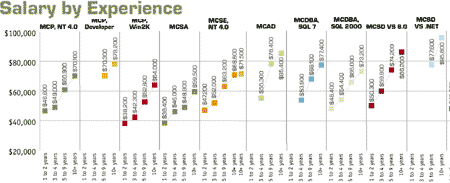 |
| . |
| Chart 6. These numbers represent only the average 2003 base salary. As expected, salaries increase with experience. The question we asked was, "How many years have you held a job that specifically involves computer networking/programming?" This question doesn't reflect direct experience with Microsoft products. Also, it doesn't include responses for self-employed professionals. |
| MCAD in the Heartland |
 Brian Wessel, $62,800 Brian Wessel, $62,800
MCSD, MCAD
Applications Consultant
4 years in IT
Milwaukee, Wisconsin
Save for a stint in the military during the Gulf War, Brian Wessel, an applications consultant with U.S. Bank, has worked in Milwaukee his whole life.
Not surprisingly, Wessel believes that being a member of Milwaukee's tight-knit IT community has helped his career: "Milwaukee has a very small IT community, and it has helped me find jobs," he explains, noting that when he was downsized from a job with a Milwaukee-based consulting company, his manager's recommendation led to half-a-dozen job offers in just two days.
Wessel snagged his current position with U.S. Bank after being cashiered -- downsized, again -- by still another consulting company. This time around, he says, the person who hired him had actually interviewed him for another IT position in the past. "Everybody knows everybody here," he admits. He was a shoo-in for the job.
Wessel started amassing certifications at a previous job. He earned an MCP -- on the company's dime -- along with an MCSD with a focus on SQL Server database design. More recently, he paid his own way to an MCAD.
Ironically, certification was not a prerequisite for Wessel's current job. "I was told flat-out by my manager that the bank doesn't value certifications," he comments. Nevertheless, Wessel concedes that his MCSD probably helped him to land his job with U.S. Bank: "They were looking for a Microsoft guy who had database experience."
Wessel is happy in IT but misses the life of a consultant. Since he earned his MCAD, he says, it's gotten harder to turn down the inevitable offers. "I've had people saying we need .NET developers, we need them in the next couple of weeks, e-mail me tonight," he reports.
As far as compensation is concerned, Wessel feels as if he's compensated fairly. "I look at the salary surveys and look at what I make, and on some I'm low, on some I'm high. I guess that means that I'm doing okay," he concludes.
-- Stephen Swoyer
|
We asked survey participants how many years they've held a job that specifically involves computer networking or programming. The level of experience for all respondents has risen -- to an average of 7.7 (up from 2002's 7.1 years). MCSDs on Visual Studio .NET lead with 9.2 years of experience on average. Following in descending order are MCTs with 9.1 years, MCSDs on Visual Studio 6.0 with 8.2 years and those who have become an MCP by passing a developer exam with 8.1 years.
These numbers point to the fact that the experienced just keep getting more so. That and the fact that the onslaught of newcomers to the program from a few years ago has waned and shows little impact on the demographics of the current crop of certified professionals.
Expertise shows up in other ways, too. The average number of servers supported by those certified professionals who work with servers, according to the survey results, is 20. The number of workstations supported by respondents who do that kind of work is 445. As the number of servers supported by the individual goes up, so does the compensation. Likewise, with workstations.
The Worth of Certification
Fifty-six percent of respondents reported they expect an increase in salary this year; but the average raise expected has dropped, from nearly 15 percent last year to 12 percent this year. While MCTs seem to be the big winner in this category, with a third of them expecting an increase of more than 25 percent, 17 percent of certified professionals across all titles expect an increase of 5 percent to 10 percent. This is lower than 43 percent of our respondents expected. This indicates that, even though 97 percent of total respondents said their income changes will be the same or higher and overall salaries seem to be on the rise, the much-anticipated annual raise isn't going to translate into a radical change in IT salaries.
Of those who expect a raise in 2003, 21 percent said it's because they have or will change employers (that statistic is down from 2001's 25 percent). It's no secret to anybody paying attention: People are staying put.
So if it's not strongly financially motivated, why do you get certified? The most frequently-cited reason is personal. Topping the list: Eighty percent of you consider certification a "personal goal." Next comes "distinguishing oneself from others," garnering a 58-percent response. Following that, 41 percent said they acquired their most recent certification to get a better job, and 24 percent said it was to get a promotion and/or raise from their current employer. Chart 7 provides detailed data.
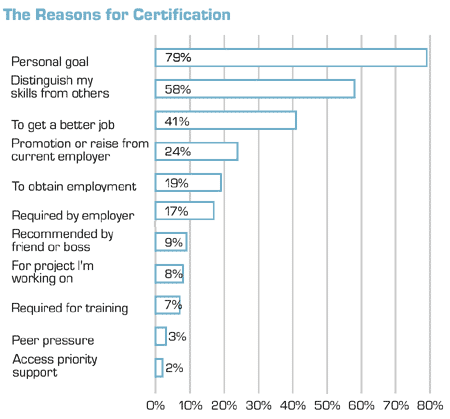 |
| Chart 7. We asked respondents to list all the reasons they achieved their most recent credential. |
Multiple Microsoft Certifications
One of the most common questions we get asked every year is what impact multiple Microsoft certifications have on salary. Microsoft declines to provide statistics about the numbers of people who hold multiple certifications, but we can come to some conclusions based on the information we derived from this year's survey. First, if you hold a combination of titles, such as MCSE and MCSD or MCSD and MCDBA, you're in rare company. Second, the more highly compensated titles drive the salaries for those who hold the dual titles. Third, because developer titles tend to be the best compensated, being able to add "developer" to your resume will generally have a positive impact on what you can earn. And fourth, if you're not interested in becoming a developer, obtaining any premium title above the basic title of MCP or MCSA will get you further in salary negotiations. Let's look at some details.
At the top of the scale, those who have the rare combination of both VS .NET MCSD and MCT titles report an average salary of $87,500. That's only slightly higher for those who have the developer title exclusively. But, it's considerably higher than the average salary earned by those who have the MCT title.
If you're an MCSA, consider going after a database credential. Salaries jumped from $47,700 to $61,000 for those who pursued a career in database management work.
Adding the MCT title to an MCSE (either NT or Win2K) can be lucrative as well, moving NT MCSEs from $61,600 to $70,900 and Win2K MCSEs from $59,400 to $68,300 (an average increase of 15 percent for both).
Other Certifications
The most popular designation, other than those from Microsoft, remains CompTIA's A+, which increased its foothold to 51 percent. This vendor-neutral certification is particularly popular among individuals holding the MCSA; 78 percent of all MCSAs said they possess the A+ too.
The second most popular certification this year is the Cisco Certified Network Associate (CCNA), held by 33 percent of all respondents. This title is especially popular among MCSEs on Windows 2000 and MCDBAs on SQL Server 7.0. Forty-four percent in both groups hold the CCNA title as well.
Chart 8 shares salaries by non-Microsoft certifications. Topping the list is Cisco Certified Security Professional at $93,500, with Sun Certified Developer for Java next at $84,500.
| Salaries by Non-Microsoft Certifications |
| 1. Cisco Certified Security Professional |
$93,500 |
| 2. Sun Certified Developer for Java |
$84,500 |
| 3. Project Management Professional |
$81,100 |
| 4. Hewlett-Packard (Compaq) Master Accredited Systems Engineer |
$80,800 |
| 5. Principal Certified Lotus Professional |
$79,500 |
| 6. (ISC)²: Certified Information System Security Professional (CISSP) |
$78,800 |
| 7. Check Point Certified Security Expert |
$78,500 |
| 8. Sun Certified Programmer for Java |
$78,000 |
| 9. (ISC)2 Systems Security Certified Practitioner |
$77,500 |
| 10. Cisco Certified Design Professional |
$76,600 |
| Chart 8. We asked respondents what certifications they held other than Microsoft's. Numbers are 2003 average base salaries. As with many comparisons, there are myriad variables (such as experience and multiple certifications) that influence compensation other than the title itself. |
Upgrade Standstill
The last couple of years have been hard on certification. We attribute the slowdown to several factors. First, of course, was Microsoft's change of heart regarding the retirement of its NT 4.0 MCSE title. Suddenly, the momentum for upgrading to the Win2K title that had built up during 2001 came to a sudden halt while people considered their options. Second, training budgets were among the first items to be dropped in the tightened corporate budgets of 2002 and 2003. Without training in some form, you don't have certification. Third, the expected arrival of Windows Server 2003 so soon after the delivery of Win2K paralyzed IT professionals. Many weren't sure whether to go ahead with certification plans already underway or await the new platform with its new titles.
When we looked at what respondents are planning for the future, 56 percent said they are planning to attain new or additional certifications in 2003. That's down considerably from last year's 90 percent.
Across all certifications, 30 percent of professionals are planning to earn at least the MCP on Windows 2003. Twenty-two percent of current MCSAs intend to upgrade to the Windows 2003 MCSA, as will 33 percent of Win2K MCSEs and 44 percent of MCTs. Twenty-eight percent of the entire population of certified professionals has set its sights on the MCSE for Windows 2003, once the exams in those tracks go live. Also, 49 percent of current Win2K MCSEs and 59 percent of MCTs are planning to earn the Windows 2003 MCSE.
New certifications addressed in this year's survey are the MCAD and VS .NET MCSD. While the MCAD is a popular next step for VS 6.0 MCSDs, with 30 percent intent on attaining it in 2003, the VS .NET MCSD is garnering most of the attention. Sixty-three percent of VS 6.0 MCSDs and a quarter of MCTs are looking to attain the newer developer certification.
| From Fighting Falcon to Certified Professional |
|
Maurice Greer, $38,088
MCSA, A+, Network+
Network Communication Specialist
2 years in IT
Washington, D.C.
For Maurice Greer, a network technology specialist with the Pentagon, the road to a fulfilling IT career got off to a bumpy start.
Greer was in the Air Force when he suffered a disability in 1998. It was then that his brother, also an Air Force member, suggested that he check out computers. "[He] suggested that I purchase a computer to relieve boredom and [stop] wasting my time," Greer explains. "This is when I was first introduced to the Internet, and I was amazed with this new finding and [its] potential."
Not surprisingly, when Greer left the military, he saw IT as a perfect field in which to embark on a new career. He enrolled in an A+ certification course in March 2000 and was also given the opportunity to take the Network+ exam. Since then, Greer reports, he has also obtained his MCSA cert, as well. "[These] have increased my pay significantly and provided an opportunity to pursue better jobs, like [at] the Pentagon where I currently work."
Greer says that he isn't finished with professional certs; he's currently studying for his MCSE, which he expects to complete in April 2004. At that point, he speculates, he'll receive a pay increase and probably another bonus.
As he racked up his credentials over the last three years, Greer worked a lot of short-term contract jobs. Contract work frustrated him, but his patience finally paid off. "I think the current economy produces a trend of short-term contract work but patience and sacrifice have rewarded me with good opportunities."
Not surprisingly, Greer believes that certifications are a requirement for long-term employment, career advancement and better pay.
As a federal employee, he acknowledges that he may not make as much as his peers in private enterprise environments. "The pay can be vastly different from the federal government side vs. the contract side in this field," he says.
-- Stephen Swoyer |
The Expense of Training
When it comes to continuing education, companies are still willing to foot some of the bill. The percentage of companies paying for certification is 48 percent, only slightly down from last year's 50 percent but higher than 2001's 46 percent.Those who achieved a developer MCP, an MCT or an MCSD were more likely to have the company cover their expenses for training and certification. Those pursuing the MCSA were more likely to cover the expense themselves.
Solution providers (firms that offer IT/IS services externally) tend to pick up the expense of training and certification with greater frequency than non-solution provider companies.
The percentage of respondents that named training as a benefit decreased again slightly this year to 54 percent, compared to last year's 58 percent, as mentioned already. While the economy is still weak, many companies have migrated to Win2K. That calls for expertise among the technical staff, which mandates at least some training. Also, in spite of what some employers believe -- that developing the skills and certifications of staff will enable them to find better jobs elsewhere -- this perk should be considered a solid method for keeping talented professionals on board.
The number of weeks allotted for training is about the same as last year. Respondents said that they receive an average of 1.1 weeks of training, which is slightly down from last year's 1.2 weeks and lower still from 2001's 1.5 weeks. MCTs and Win2K MCSEs lead the pack in training time, with 1.6 weeks and 1.2 weeks, respectively.
Spending on professional development has risen significantly. Whereas last year, respondents said they expected to spend an average of $1,850, this year they're expecting to spend $2,413. MCTs are at the high end, predicting an outlay of $2,896, followed by MCSEs on Win2K at $2,645. On the low end are MCADs, who expect to spend an average of $1,889. Respondents said they spent an average of 75 hours preparing for their most recent certification exam.
As usual, books prove to be the most useful resource, with 92 percent of you going that route to increase your knowledge. That's followed by on-the-job training (69 percent). One highlight to note: It appears certification candidates are beginning to shy away from braindump sites, with only 27 percent of you employing this method for preparation (down from 40 percent in 2001).
External vs. Internal Support
Every year, we list two main types of organizations -- companies that provide services to external customers (solution providers, value-added retailers or systems integration firms) and organizations that serve internal customers (corporate IT/IS) -- and ask respondents into which category their job role best fits. Among those of you who aren't self-employed, 32 percent work for a solution provider and 68 percent serve internal customers.
The average difference in compensation between these two types of employers is still substantial -- $6,500 -- but that's down from last year's $8,200. Regardless of certification, those of you who work for solution providers earn an average of $67,400. Those of you providing internal IT services average $60,900. VS .NET MCSDs earn the most, with external-service workers taking in $88,000 and internal professionals earning $73,500.
Those of you who work for solution providers also enjoy larger average bonuses ($2,858) than those in corporate IT/IS ($2,125). One point to note: External-services professionals typically are more experienced, though not by much. They have, on average, 8.2 years in the field vs. 7.5 years for corporate IT/IS workers.
Industry Impact
We're always interested to learn and report on what industries are paying the best. This year, those who work for Web/software development/ISV firms earn, on average, $73,000, followed by system/network integration company workers, who receive $67,600. It's important to note that most of these types of firms can be considered solution providers, and we've already pointed out that solution providers tend to compensate better than companies who use IT professionals for internal support. Perhaps not surprising, those who work in education are the poorest compensated, with an annual salary of $53,100. (However, it's worth pointing out that educational facilities that are public may offer more stability and better benefits than private companies these days.)
| Just Can't Get Enough |
|
Mark Williams, $36,288
MCSE, MCSA, MCT, A+, Network+
Network Technical Specialist
9 years in IT
Nashville, Tennessee
Mark Williams, a network technical specialist with the state of Tennessee, is nothing less than a certification junkie. He's got eight of them, after all, and he says that he's nowhere near finished.
"Before I went into technology and before I accepted the position that I was going into, I came to grips with the understanding that when I get to the point where I don't want to learn anymore, then I need to step aside, because there's always some kid waiting to step in and make me look like a DOS antique," he explains.
Williams practices what he preaches. Over the last three years, he's racked up his MCP+Internet, MCSA, MCSEs on NT 4.0 and Win2K, MCT and CompTIA A+ and Network+ certifications. Regarding the school where he trained, he says, "I hold a record at New Horizons for taking and passing the most core exams in one month."
If you think that all of the certifications that Williams has amassed have endeared him to his employer, you'd be mistaken, however. "The state of Tennessee does not acknowledge certifications at all," he laments. "I am the only MCT working in state government, and I have the most certifications of anybody there, and yet I am not acknowledged in the higher levels of technology leadership."
Why pursue certification when the recognition and remuneration aren't there? For Williams it's all about personal achievement: "It's my pat on the back, my flag to fly to the world that I have achieved this and that I have that understanding."
In spite of the economic downturn, Williams is optimistic about IT as a career. He loves technology, he says, and looks forward to a day when his skills -- and, yes, all of his certifications -- are more fully appreciated. "I'm [considering] some offers that I'm looking at as far as teaching full-time elsewhere or being a full-time technician, because I don't believe the state is ever going to acknowledge my accomplishments," he says.
-- Stephen Swoyer |
The Skills That Pay Best
An excellent determining factor of compensation is skill -- specialization is frequently a smart way to set yourself apart in your field. This year, the best compensated skill is expertise in data warehousing, which brings in $71,800 (an oddity since salaries sank for certified database experts overall). The next most-valued skill is software design, which reports an average salary of $71,700. Those of you with 10 or more years of experience can add about nine percent to both those averages.
When we drilled down on which Microsoft specializations bring in the highest paycheck, we found that those whose primary area of expertise is BizTalk Server ($82,100), Commerce Server ($81,900) or Content Manager Server ($73,400) top the list (See Chart 9 for salaries by Microsoft expertise). Of course, these are some of the more uncommon areas of specialty, with only one percent of our total respondents naming them. Also, 85 percent of those who listed these three areas of skill have at least five years of networking experience. Apparently, you can't expect to hang out a shingle with a specialization before you have the fundamentals down cold.
| Salaries by Microsoft Expertise |
| BizTalk Server |
$82,100 |
| Commerce Server |
$81,900 |
| Content Management Server |
$73,400 |
| Host Integration Server |
$72,700 |
| SharePoint Portal Server |
$72,400 |
| Visual Studio |
$71,300 |
| Project Server |
$70,300 |
| Windows Server 2003 |
$68,300 |
| SQL Server |
$67,800 |
| Site Server |
$67,600 |
| Windows 2000 Datacenter Server |
$67,500 |
| Internet Integration Server |
$66,300 |
| Mobile Information Server |
$66,300 |
| Systems Management Server |
$65,300 |
| ISA Server |
$65,100 |
| Microsoft Operations Manager |
$64,600 |
| Application Center |
$63,600 |
| Windows NT Server |
$62,700 |
| Exchange |
$62,100 |
| Windows 2000 Server or Advanced Server |
$61,400 |
| Office/Visio/FrontPage |
$61,300 |
| Small Business Server |
$59,400 |
| Windows Client Support |
$58,800 |
| Chart 9. When it comes to compensation by Microsoft expertise, specifically, newer technologies tend to bring in the higher salaries. It's likely that professionals working with these more specialized technologies also typically have more years of experience and are, therefore, better paid. |
Other Income
IT professionals, overall, don't look to outside income as a great monetary source. The number of respondents who expect to receive additional money from moonlighting stands at 39 percent, up about a percent from last year. But the average amount is expected to decrease from 2002's $2,777 to $2,309.
MCTs and VS .NET MCSDs top the scales in outside income, with averages of $5,873 and $2,836, respectively. MCPs with a developer focus earn the least this way: $1,305.
Also, the amount of extra income is proportionate to years of experience. Those with four years or fewer of experience reported they earn less than $2,000 in extra income, while those with 10 or more years under their belts garner nearly $3,000, on average.
Balancing Act
It could be that one reason outside-earned income is lower again this year is that you're putting extra time in at the office. The average is 45 hours a week. That's fairly consistent across all job titles and certifications, although MCTs topped the numbers at 47 hours per week.
If you're looking for a bigger paycheck, remember that it comes at a personal cost. About 36 percent of respondents said they work more than 46 hours per week; these same professionals make almost 9 percent more than those who work fewer hours. If you're looking to put your income in the mid-$70,000 range, you'll need to be ready to put in an average of 51-plus hours per week.
The average amount of available vacation time for IT professionals increased slightly to 2.7 weeks. Across the board, you receive between two and three weeks of vacation time a year. Fifty-eight percent of you plan to take nearly all that time.
| MCP-ing It in Paradise |
|
 Lisa Veneri, $31,200 Lisa Veneri, $31,200
MCP
Information Systems Specialist
4 years in IT
Honolulu, Hawaii
If it weren't for a freak bicycle accident, Lisa Veneri, an information systems specialist with Copiers Hawaii Inc., might still be a helpdesk attendant.
Veneri, a graduate of a computer technical school, says that she didn't mind her helpdesk support role with Disney Interactive, even though it meant that she often spent more time standing at users' desks than sitting behind a computer.
After a bicycle accident sidelined her, she was again forced to spend long stretches behind a computer. As a result, Veneri explains, she decided to pursue her MCP certification in networking -- at her own expense, of course.
With MCP in hand, Veneri was tapped by Copiers Hawaii, a Sharp reseller based in Honolulu, Hawaii, to provide pre- and post-sales support to customers. In her current position, Veneri often parachutes into customer IT organizations and installs cluster printing and server/host printing software. In this respect, she says, her MCP has been a big help -- a fact that her company also recognizes.
"They have paid for my past exams and have agreed to send me to further classes if I need them," she comments. "It was important for them to have someone who can go in there [customer sites] and talk the talk."
The upshot is that Copiers Hawaii will fund Veneri's MCSA and MCSE certifications, as well. That's important, she says, because "nowadays, certifications give you more respect when you're out there in the IT world."
Veneri enjoys working in IT almost as much as she loves living in Hawaii -- even though she acknowledges that she could probably earn more working in the "mainland" U.S. "I'm treated very well, and pretty much any class I want to take, anything I want to do, they'll pay for it. Plus, it's fun to be part of a young company that is growing."
-- Stephen Swoyer |
The Art of Happiness
Maybe it's superfluous at present to worry about something as subjective as "job satisfaction." Yet you spend many of your waking hours at your job, so you should have at least some level of contentment with what you're doing.
Yet only slightly more than a quarter of you report being very satisfied with your overall job. Seventeen percent are not satisfied, and the rest of you fall in the middle somewhere.
The least satisfied among you work on help desks and provide user support. The most satisfied are those who work as trainers or managers. (This comparison excludes the self-employed who are more satisfied with their jobs than anybody else.) Interestingly, satisfaction goes up the longer you're on the job; you might expect the opposite, that people newer to a field would tend to show more enthusiasm.
We delved into the specifics and learned that 91 percent of respondents are satisfied or very satisfied with coworkers and 74 percent are content with direct management. However, 38 percent said they're not satisfied with their company's overall management. But the area that causes IT professionals the most unhappiness is compensation. Nearly half of you were unsatisfied with that. In that case too, the self employed were nearly as unhappy. That meshes with the fact that half of all respondents believe they're not as well compensated as others in the industry. One item to note: Of the few (17 percent) who trust they bring in higher salaries, about 55 percent (down from two-thirds last year) said that the higher compensation was due, in part, to their certification.
| From the Cradle |
|
 Daryl Valent, $75,000 plus $5,000 bonus Daryl Valent, $75,000 plus $5,000 bonus
MCDBA, MCSE+I, MCSA, A+
Network Systems Engineer
20 years in IT
Tampa, Florida
Like many certified professionals, Daryl Valent, a network systems engineer with a Tampa-based manufacturing firm, got his start working in IT at a very early age -- while he was still in middle school, as a matter of fact.
When his suburban Chicago school obtained a Radio Shack TRS-80 Model 1 computer, confused teachers tapped Valent and several of his classmates to figure out what the heck to do with it.
"None of the teachers had the faintest idea what the thing was, so in each school they picked a handful of students to figure it out," he explains.
Since then, Valent has amassed 20 years of IT experience. During that time, he's worn many hats -- from software developer to network engineer -- and has also written games, published articles and developed electronic devices that have been used in the Space Shuttle and in the U.S. Navy's Seawolf-class nuclear submarines.
Valent didn't get certified until 1998. A late bloomer, he's since picked up his MCP+I, MSCE+I, MCSA and MCDBA certifications. Since being certified, Valent has averaged the passing of six Microsoft tests a year and says that he'll continue to do so "as long as there is a Microsoft or some equivalent."
Perhaps because of his years of experience, Valent doesn't believe that certification is an absolute requirement for employment, but allows that it "can definitely give an edge to someone looking to advance in a crowded, competitive IT environment."
At the same time, Valent says that he values his certifications. "Half of the success … comes from an internal boost in self-esteem and … knowledge."
He feels that he's adequately compensated, at least in comparison with his peers, but stresses that "there's always room for improvement!"
-- Stephen Swoyer |
Good News on the Gender Front
It's probably no shock that the women in our study -- 10 percent of respondents -- aren't as well compensated, overall, than their male counterparts. This year, men are bringing in an average of $62,000, while women are earning an average of $59,400 -- a difference of $2,600. Believe it or not, though, this is excellent news. Last year, the disparity in income was $4,200, compared to $7,100 in 2001 and a whopping $10,000 in 2000. The gender/income gap is getting smaller every year.
Also, this year, there are three certifications in which women are earning more money than men -- the Win2K MCSE, with a $1,300 advantage ($60,600 for women, $59,300 for men); the NT MCP, in which there's a $1,600 margin ($60,100 for women, $58,500 for men); and the MCSA, with a $2,500 lead ($50,100 for women, $47,600 for men).
On the flipside, the certifications with the greatest deficits are both developer-oriented. Male MCP developers earn $9,500 more than those who are female ($70,300 vs. $60,800), and VS 6.0 MCSD holders who are men garner $9,700 more in average compensation ($75,300 vs. $65,600).
The certifications in which women are the least represented are the MCAD and the SQL Server 2000 MCDBA, both at seven percent. On a more positive note, the percentage of female MCTs and Win2K MCPs stands at 13 percent. Also, 14 percent of all people with the MCP designation in our study are women.
The Value of Education
While formal education isn't the greatest factor in compensation, it does have its place. Those who have attended some college reported earning slightly more ($58,300) than those with a two-year degree ($56,400). The small difference is most likely due to the fact that those who chose to discontinue their formal education got a jump, experience-wise, on those who stayed on and completed their four-year degree or higher.
Once again, education plays a role in overall compensation. At the bottom of the rung are those with, at most, a high school education: $55,800. Those who hold a doctorate top out the list at $72,500.
| Certified Director of IT |
|
 Pamela Fine, $60,000 Pamela Fine, $60,000
MCSE Director of IT
3 years in IT
Alexandria, Virginia
In at least one respect, employees at the not-for-profit New American Schools (NAS) in Washington, D.C. are lucky: If they've got a question about IT, their boss, Pamela Fine, can probably answer it in any of three different languages.
That's because Fine, who became NAS' Director of IT last year, has a BA in Modern Languages and speaks French, Italian and Spanish. As if that's not enough, she's also studied at the University of Paris.
Although her pedigree is not without geeky-ness -- her father was a life-long IBM-er, and she received her first PC when she was seven -- Fine concedes that she "had no thought of going into IT" when she finished school.
Fine's COO tapped her for a new role. "She came to me and asked me if I wanted to take over IT, which was interesting, of course, because I didn't have any background in IT. So I thought about it for a couple of days and talked with my father, who is in the field, and he said, yeah, give it a shot."
Before she accepted the position, however, Fine extracted a promise of training and certification from NAS. Since then, she's earned her MCSE, trained on the job, and largely revamped NAS' IT infrastructure along the way.
Is she happy with the decision she made? You'd better believe it: "I love working in IT. It's been a lot of fun, a lot of hard work, so many late nights -- but I wouldn't change anything," she comments.
Fine isn't finished with her certifications, either. She's currently studying for her CCNA and says that she will pursue other certs when the need arises.
As far as compensation is concerned, Fine stresses that NAS is a non-profit based in a major metropolitan area. Because of this, she allows, she's not as well compensated as some of her peers. "If I were to work in the private sector, I would probably be making a lot more, but it's just great to be a part of this [non-profit work], and I love the challenges," she concludes.
-- Stephen Swoyer |
Final Thoughts
So what can you take away from this year's survey? First, if you have a stable job, you should be happy. Your salary is higher, and the economy seems to be beginning to thaw. Of course, you shouldn't expect to see the salaries that were so prevalent in the late 1990s, but they are better. And even if you don't have a job or don't feel as if your numbers match up with ours, remember that there are excellent jobs out there -- and salaries to go along with them.
When the times do get better, you're going to need to be prepared. Experience is (and most likely always will be) the greatest factor when it comes to compensation. Keep getting as much knowledge and hands-on practice as you can -- even if it doesn't equate to more pay at this time.
It's also important to take your geographical location into consideration. If you reside in or near a major metropolitan area, your salary will tend to be higher than those who live in more rural areas. Our results suggest it's a $10,000 difference. Also, keep in mind that the cost of living will vary from one size of community to another. Chart 10 provides a breakdown of salary by metropolitan region.
| Salary Breakdown by Metropolitan Region |
| Albuquerque |
$58,600 |
| Atlanta |
$68,000 |
| Austin |
$63,200 |
| Baltimore |
$61,700 |
| Birmingham |
$57,000 |
| Boise |
$51,800 |
| Boston |
$69,300 |
| Buffalo |
$54,900 |
| Charlotte |
$61,900 |
| Chicago |
$68,400 |
| Cincinnati |
$63,800 |
| Cleveland |
$57,900 |
| Columbus |
$62,300 |
| Dallas/Fort Worth |
$67,200 |
| Denver |
$63,200 |
| Des Moines |
$58,300 |
| Detroit |
$62,300 |
| Honolulu |
$58,200 |
| Houston |
$64,800 |
| Indianapolis |
$59,500 |
| Kansas City |
$59,600 |
| Las Vegas |
$51,100 |
| Los Angeles |
$67,800 |
| Memphis |
$56,600 |
| Miami |
$57,900 |
| Milwaukee |
$60,400 |
| Minneapolis |
$63,100 |
| Nashville |
$62,100 |
| New Orleans |
$52,200 |
| New York |
$70,300 |
| Oklahoma City |
$48,600 |
| Omaha |
$55,600 |
| Orlando |
$54,500 |
| Philadelphia |
$62,000 |
| Phoenix |
$63,700 |
| Pittsburgh |
$54,500 |
| Portland, OR |
$62,600 |
| Sacramento |
$59,800 |
| Salt Lake City |
$57,200 |
| San Antonio |
$62,700 |
| San Diego |
$68,100 |
| San Francisco |
$74,400 |
| San Jose |
$81,900 |
| Seattle |
$64,600 |
| St. Louis |
$58,900 |
| Tucson |
$49,300 |
| Washington, D.C. |
$71,900 |
| Chart 10. We asked respondents to name the metropolitan area in which they reside, then tabulated the average 2003 base salary. For salary by specific credential -- MCP, MCSE on NT 4.0, MCSE on Win2K and MCSE on Visual Studio 6.0. |
The final factors to consider are areas of job specialization and, of course, certification. Those with higher-level designations (such as MCSE and MCSD) who are well versed in the latest and greatest technologies and seek to serve in a leadership role -- whether by title or by temperament -- will, by nature, earn higher salaries than those who stay content with an entry-level MCP credential and never seek to go beyond help desk work.
It's no great mystery; we're in lousy economic times. Signs of recovery light up like July 4th sparklers, but just as quickly die out. What can you do until the economy perks up and companies begin expansion again in a big way? Just as we've learned in previous years, experience is key. Keep current, aggressively pursue your education, and don't forget to network! ("Soft skills" play a major role in getting a job and keeping one.) The economy will rebound given enough time. When that happens, companies will be ready to expand and grow -- and IT will play a key role in that effort. You'll be well positioned to provide knowledge and expertise -- and to lead the way on technology fronts. We recommend you take control of your destiny by seeking out new projects, new knowledge and new certifications.
Download the full PDF version here.